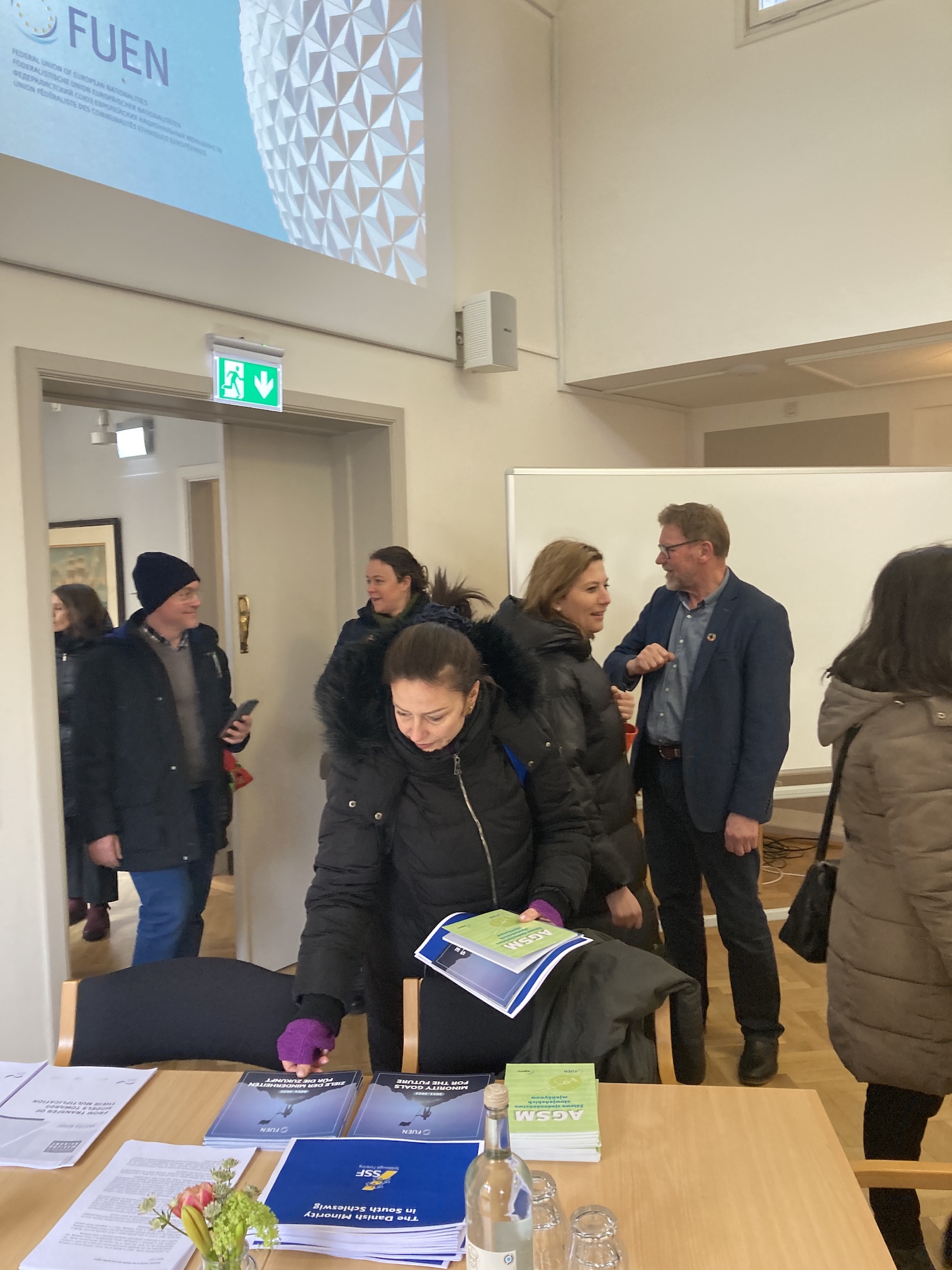Western Balkans delegation discusses with FUEN: How does diversity management succeed?
02.03.2023It was a very special group that visited us in Flensburg on 1 March: Twelve representatives of municipal administrations and institutions from Serbia, Albania, Bosnia and Herzegovina, Macedonia and Kosovo were visiting Schleswig-Holstein this week to learn more about diversity management. A visit to FUEN in Flensburg could not be missing from the agenda.
"Cooperation and collaboration strengthens society as a whole," explained FUEN Vice President Gösta Toft in his welcome address. "Cooperation between minorities, but especially between minority and majority, is important and leads to good development of a region as a whole." Fruitful cooperation with municipalities, communities and the state is very important in order to "develop things together and not turn our backs on each other", emphasised Bahne Bahnsen, who spoke as Vice-President of FUEN and at the same time gave the guests lively insights into the everyday life and challenges of his own Frisian minority in Schleswig-Holstein.

Martin Lorenzen (Südschleswigscher Wählerverband, SSW) described the role of the Danish minority in Schleswig-Holstein to the participants, while Uwe Jessen (Bund Deutscher Nordschleswiger) shed light on the other side of the border, where the German minority in Denmark is at home.
Now it was time to put theory into practice – at a workshop led by Zora Popova, FUEN scientific officer. Following the World Café method, three groups gathered at tables where they were asked to find answers to the following questions in three steps:
- Who are the minorities in your community? What particular challenges do they face?
- How can these challenges be addressed? How can the minorities be involved to participate in the solutions?
- What are the barriers to minority inclusion and how can they be overcome?
Good discussions, new insights and food for thought were gained by the participants from the Western Balkans in this way. Perhaps some of them will return home with ideas and implementation aids that will make living together in their home countries a little richer and more equal for all groups in society.
Background
The countries of the Western Balkans are currently in the process of creating an appropriate long-term framework to ensure the social and economic inclusion of all social groups and equal access to economic, social and cultural rights. Although appropriate legislation, strategies and action plans exist at the national level, implementation at the local level is a challenge. This is where this project comes in. The exchange between Schleswig-Holstein and the Western Balkan countries is based on cooperation with the programme "Social Rights for Disadvantaged Groups" of the Gesellschaft für internationale Zusammenarbeit (GiZ) in cooperation with the Schleswig-Holstein State Chancellery and is a continuation of our FUEN Western Balkans project, which was launched a few years ago – with great success: for example, a minority representative has now started work in Macedonia, following the example in Schleswig-Holstein. This is a good example of the multiplier effects of such exchange programmes.
Photo credit: FUEN
SAJTÓKÖZLEMÉNYEK
- New secretariat in the Polish parliament supports national and ethnic minorities
- FUEN calls for the inclusion of the Ladin language at the 2026 Winter Olympic Games
- FUEN Urges UN Special Rapporteur to Advocate for a Coherent EU Minority Protection Framework
- FUEN wishes you a peaceful Christmas season, restful days and a bright, hopeful start to the new year!
- FUEN calls on the EU to act over systematic ethnic-based land confiscations in Slovakia
- Women of Minorities conference in Budapest calls for structural change to ensure equal political participation of minority women
- FUEN President Olivia Schubert at UN Forum on Minority Issues in Geneva
- "Laboratory of Peace": 28th Seminar of Slavic Minorities held in European Capital of Culture Gorica/Gorizia
- Equality in Political Participation and Representation: Third “Women of Minorities” Conference to Be Held in Budapest
- FUEN Working Group on Education discusses challenges and future of minority schooling in Europe














